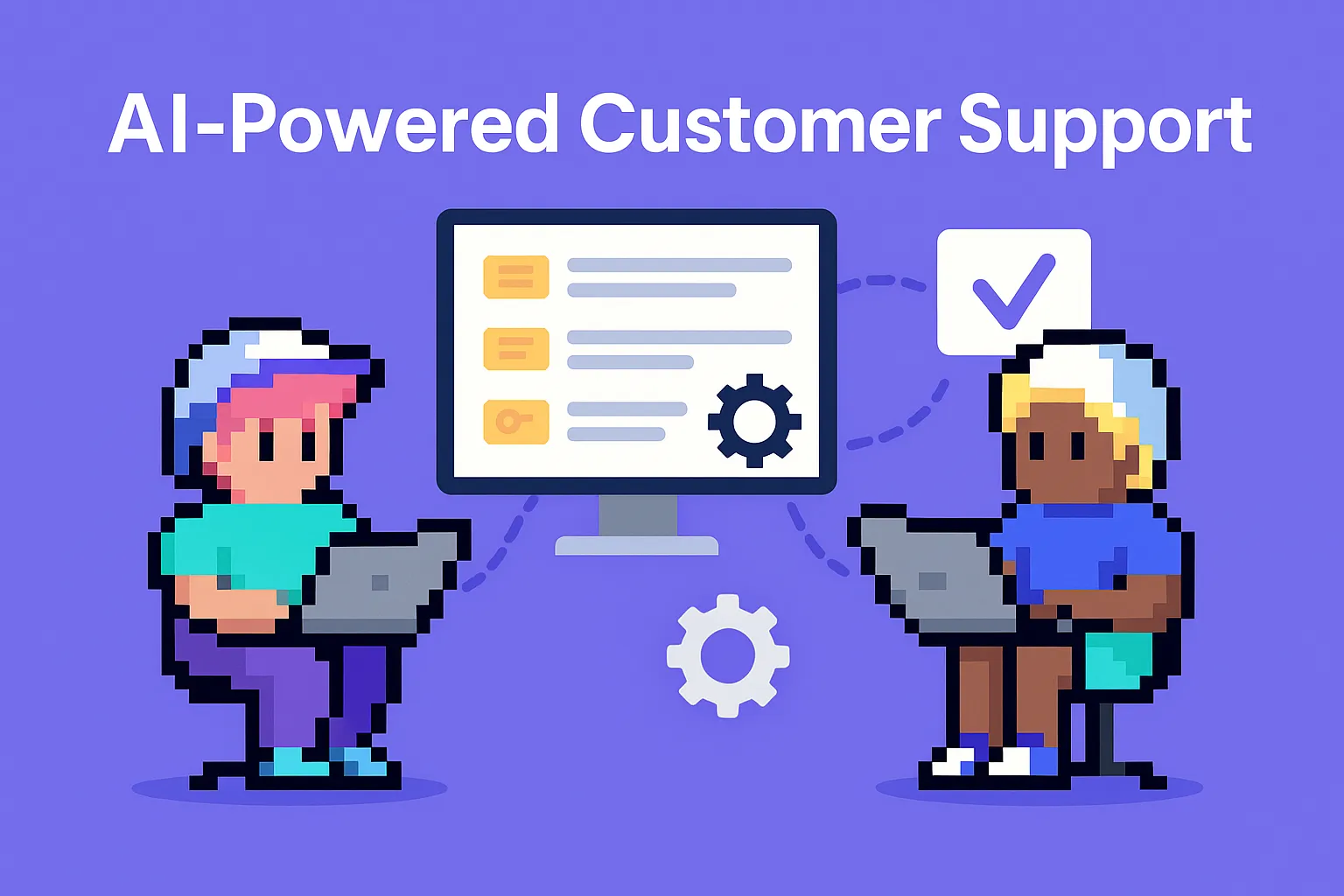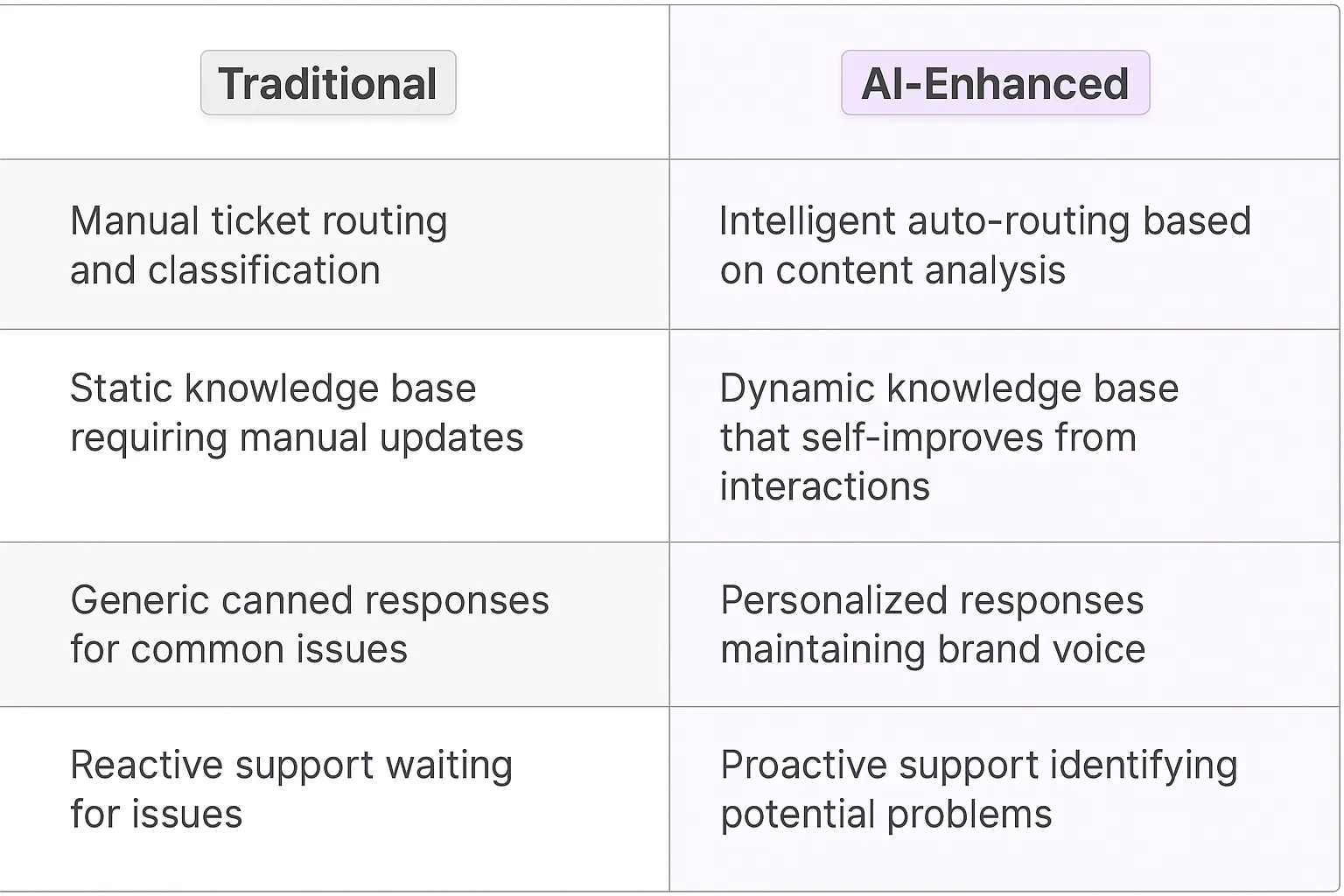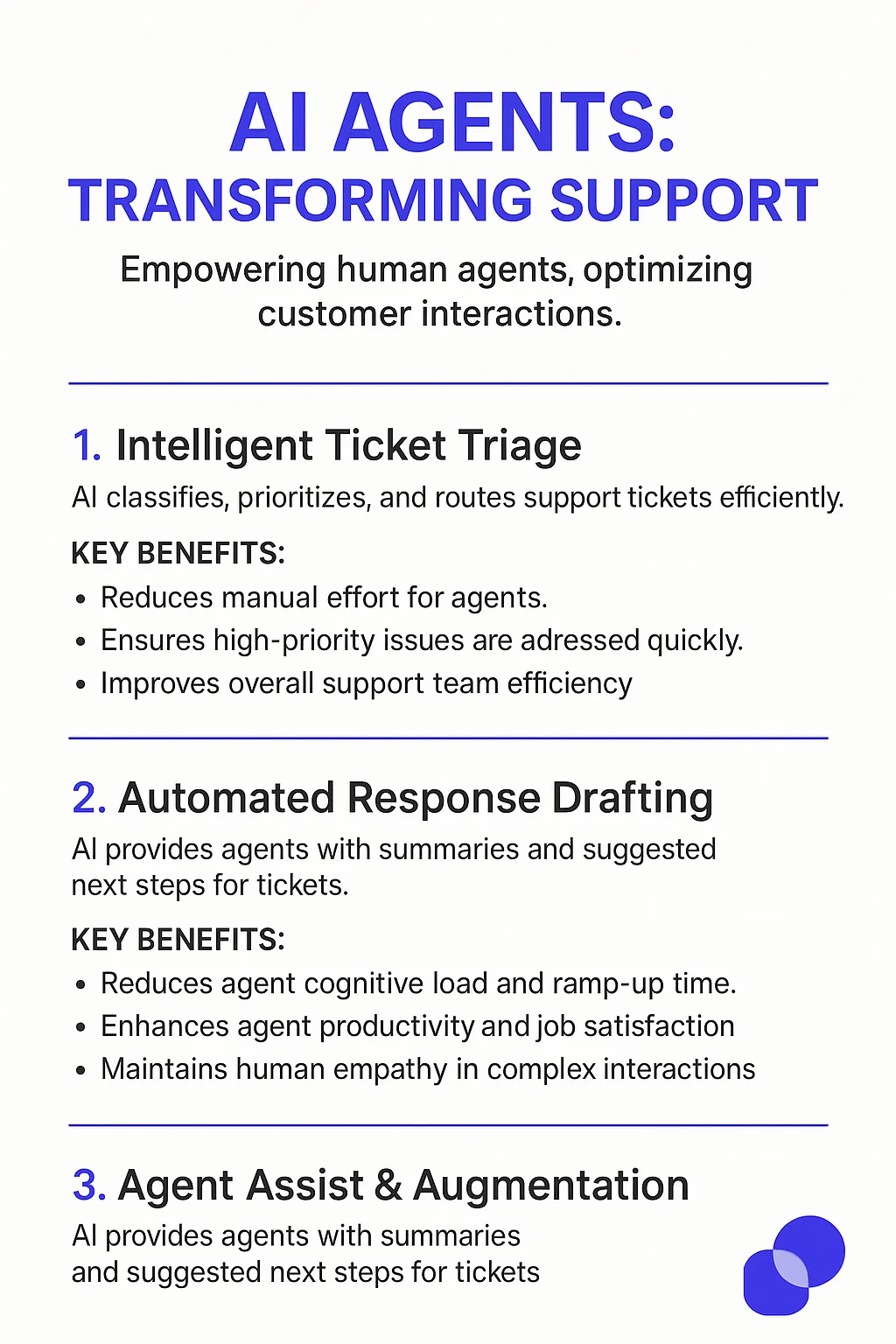Groove
Understanding Groove's Evolution into an AI-Enhanced Support Platform
Groove stands out as a customer support platform that combines powerful ticketing capabilities with intelligent workflow automation. The platform enables support teams to manage customer communications efficiently while maintaining personalized service quality. With the integration of AI Agents, Groove has evolved from a traditional helpdesk solution into an intelligent support ecosystem.
Key Features of Groove
The platform's core strengths lie in its unified inbox, customizable workflows, and detailed analytics. Teams can manage emails, chats, and social media interactions from a single interface. Knowledge base integration allows quick access to support documentation, while collaboration tools enable seamless handoffs between team members. Advanced reporting provides insights into team performance and customer satisfaction metrics.

Benefits of AI Agents for Groove
What would have been used before AI Agents?
Customer support teams using Groove previously relied on static knowledge bases, canned responses, and manual ticket routing. Support agents spent countless hours searching through documentation, copying and pasting responses, and determining which team member should handle each inquiry. The cognitive load of context-switching between different customer conversations while maintaining quality and speed created significant friction.
What are the benefits of AI Agents?
AI Agents transform Groove's support operations through intelligent automation that actually enhances the human element rather than replacing it. These digital teammates handle the heavy lifting of ticket classification, routing, and initial response drafting - but in a way that feels natural and personalized.
The most compelling benefit is how AI Agents learn from your team's best practices and institutional knowledge. They observe how top performers handle different types of inquiries and replicate those patterns at scale. This creates a powerful feedback loop where the AI gets smarter over time while maintaining your brand voice and support quality standards.
For support leaders, AI Agents provide unprecedented visibility into conversation patterns and opportunities for optimization. The AI surfaces insights about common customer pain points, knowledge gaps, and areas where additional training or documentation could have the biggest impact.
At the agent level, AI removes the cognitive burden of context switching between conversations and hunting for relevant information. Support staff can focus their energy on building customer relationships and solving complex problems while their AI teammates handle routine inquiries and administrative tasks.
The network effects are particularly powerful - as more teams adopt AI Agents in Groove, the collective intelligence grows exponentially. The system learns from thousands of support interactions across different use cases and industries while keeping each organization's data secure and separate.

Potential Use Cases of AI Agents with Groove
Customer Support Enhancement
AI Agents transform Groove's customer support capabilities by analyzing incoming tickets and automatically categorizing them based on urgency and topic. They detect sentiment in customer messages and flag high-priority issues that require immediate attention, ensuring critical support needs never fall through the cracks.
Knowledge Base Optimization
The AI Agent continuously scans support conversations to identify common issues and questions, then automatically generates and updates knowledge base articles. This creates a dynamic, self-improving documentation system that evolves with customer needs and reduces repetitive inquiries.
Response Quality Management
Support teams benefit from AI-powered response suggestions that maintain consistency across all customer interactions. The AI analyzes past successful responses and adapts them to new situations, while preserving the company's tone of voice and ensuring accuracy of technical information.
Workflow Automation
AI Agents handle routine tasks like ticket routing, status updates, and follow-up scheduling. They recognize patterns in support requests and automatically assign tickets to the most qualified team members based on expertise and workload.
Performance Analytics
The AI continuously monitors support metrics and generates detailed insights about response times, resolution rates, and customer satisfaction. It identifies bottlenecks in the support process and suggests specific improvements based on data patterns.
Customer Experience Optimization
AI Agents analyze customer interaction history to provide context-aware support. They identify opportunities for proactive outreach and personalized solutions, creating a more engaging and effective support experience.
Team Collaboration Enhancement
Support teams gain efficiency through AI-powered internal knowledge sharing. The system identifies subject matter experts within the organization and facilitates connections between team members working on similar issues.
Multilingual Support Scaling
AI Agents enable seamless multilingual support by providing real-time translation and cultural context awareness. This allows support teams to maintain high-quality interactions across language barriers without increasing headcount.
These use cases demonstrate how AI Agents enhance Groove's capabilities while maintaining the human element in customer support interactions. The technology serves as a force multiplier for support teams, enabling them to focus on complex problem-solving and building stronger customer relationships.

Industry Use Cases
Groove AI agents fundamentally reshape how sales teams operate across different sectors. The technology's ability to analyze customer interactions, automate follow-ups, and provide data-driven insights creates unique advantages for organizations of all sizes. From SaaS companies to manufacturing firms, these digital teammates deliver specific, measurable improvements to sales processes.
The real power lies in how Groove's AI adapts to distinct industry requirements. A B2B software company might leverage the technology to qualify leads and personalize outreach at scale, while a financial services firm could use it to maintain compliance while accelerating deal cycles. These aren't theoretical benefits - they're practical applications that directly impact revenue and team efficiency.
Looking at specific industry implementations reveals patterns of success that transcend individual sectors. The following examples demonstrate how different businesses harness Groove's AI capabilities to solve their unique challenges and create competitive advantages in their respective markets.
Technology Industry: AI-Enhanced Sales Outreach
Software companies face a unique challenge - their sales teams need to connect with technical decision-makers while maintaining authentic, value-driven conversations at scale. A Groove AI Agent transforms this dynamic by analyzing past successful sales interactions and applying those insights to new prospect engagement.
When selling complex enterprise software solutions, timing and context matter immensely. The AI Agent examines signals like a prospect's tech stack, recent funding rounds, and hiring patterns to identify optimal outreach moments. It then crafts personalized messages that speak directly to the prospect's specific technical challenges and growth stage.
For example, when a SaaS company's sales team targets mid-market CTOs, the AI Agent can detect which prospects are actively evaluating similar solutions based on their digital footprint. It automatically adjusts message timing and content - sending technical white papers to engineering-focused buyers while providing ROI analysis to business stakeholders.
The real power emerges in the AI Agent's ability to learn from each interaction. Every response, meeting scheduled, and closed deal feeds back into its understanding of what resonates with different technical buyer personas. Sales teams using this approach have seen 40-60% increases in response rates because their outreach becomes increasingly targeted and relevant over time.
Beyond just crafting messages, the AI Agent handles the complex choreography of multi-thread sales conversations. It tracks when prospects engage with shared content, automatically schedules follow-ups at optimal times, and suggests the next best actions based on the prospect's behavior patterns. This gives sales teams more time to focus on high-value activities like solution design and relationship building.
Financial Services: Data-Driven Client Acquisition
Investment firms and wealth management companies operate in an environment where every client interaction needs to be precisely calibrated. The Groove AI Agent fundamentally shifts how financial advisors identify and nurture high-value prospects by applying machine learning to relationship development.
The AI Agent analyzes market signals, wealth events, and behavioral patterns to spot optimal engagement opportunities. When a prospect receives an inheritance, changes jobs, or exercises stock options, the system triggers targeted outreach sequences that align with their new financial situation.
A wealth management firm in Boston implemented this approach across their advisor team. The AI Agent monitored public data sources and social signals to identify prospects experiencing significant liquidity events. It then generated sophisticated outreach campaigns that addressed specific wealth preservation strategies and investment opportunities relevant to each prospect's situation.
The results proved transformative - advisors using the AI-enhanced system saw their qualified lead pipeline grow 3x while spending 50% less time on prospecting activities. The system's ability to detect subtle signals - like changes in board positions or real estate transactions - created opportunities for perfectly-timed conversations about wealth management strategies.
Most compelling is how the AI Agent adapts its approach based on prospect engagement patterns. It learns which types of investment insights resonate with different demographic segments and automatically adjusts content and timing. When a prospect shows interest in ESG investing, for example, the system shifts to highlight relevant sustainable portfolio options.
This network-driven approach to financial services sales represents a step-function improvement over traditional cold outreach methods. By combining rich data analysis with intelligent sequencing, firms can scale their most successful prospecting tactics while maintaining the personal touch essential in wealth management relationships.
Considerations and Challenges
Implementing Groove AI agents requires careful planning and strategic thinking around several key areas. The technical architecture and operational processes need thorough evaluation before deployment.
Technical Considerations
Data privacy remains a critical concern when deploying AI agents within Groove's customer service platform. Organizations must establish robust security protocols to protect sensitive customer information and maintain compliance with regulations like GDPR and CCPA.
Integration complexity can vary significantly based on existing tech stacks. Legacy systems may require additional middleware or custom APIs to enable smooth data flow between Groove and AI components. Teams should map out data schemas and authentication methods early in the implementation process.
Operational Challenges
Change management deserves focused attention when introducing AI agents. Support teams often have established workflows and may resist new tools that alter their daily processes. Creating a clear transition plan with adequate training resources helps drive adoption.
Performance monitoring requires new metrics and KPIs specific to AI interactions. Traditional service metrics like response time and resolution rate need adaptation to account for AI-human collaboration scenarios. Teams should define baseline measurements before deployment to track improvement.
Strategic Planning
Use case prioritization helps organizations maximize ROI from Groove AI agents. Starting with focused, high-impact scenarios allows teams to demonstrate value while building institutional knowledge. Common initial applications include ticket classification, response suggestions, and knowledge base article recommendations.
Scaling considerations affect both infrastructure and team dynamics. As usage grows, organizations need plans for increased computing resources, expanded training data, and evolved governance models. Building flexibility into early architectural decisions prevents future constraints.
The Future of AI-Enhanced Support Teams
AI Agents represent a fundamental shift in how support teams operate within Groove. The technology creates a virtuous cycle where human expertise combines with machine learning to deliver increasingly sophisticated customer support. Organizations that successfully implement these digital teammates gain significant advantages in efficiency, scalability, and service quality. As the collective intelligence grows through network effects, the gap between AI-enhanced teams and traditional support operations will continue to widen.













